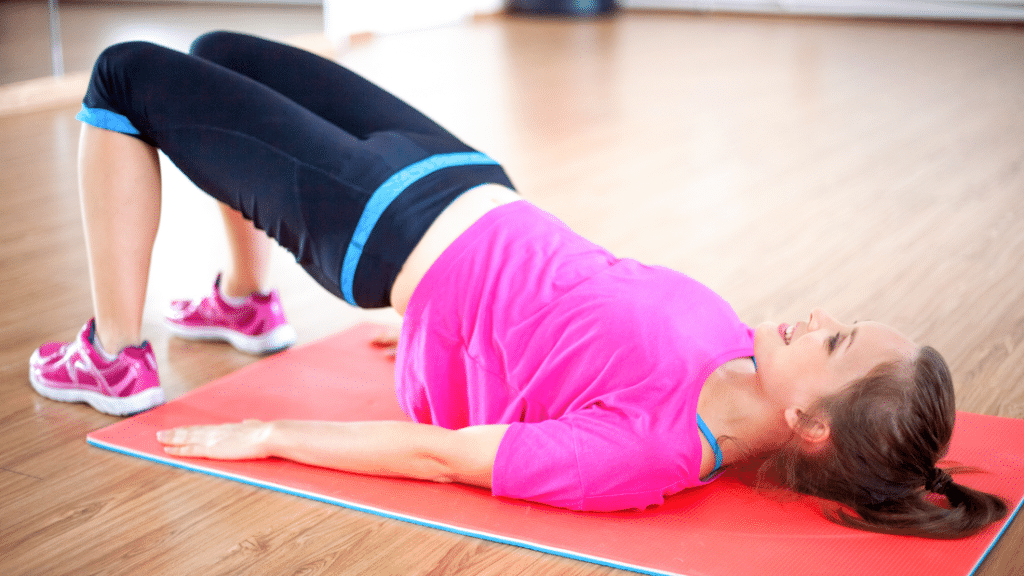As we enjoy the picturesque views that Pocatello has to offer, there is an underlying issue that many silently struggle with Tightened pelvic floor muscles.
Imagine the frustration of feeling a constant, underlying discomfort, the intimacy issues that might arise in your relationships, the hesitancy to participate in social events, or the insecurity of experiencing urinary inconsistencies
Are any of these things worrying you?
Fear not.
We’re here to help.
Every woman dreams of living freely, unburdened by the limitations that pelvic discomfort imposes.
That’s why, in this blog, I am going to share with you 3 exercises that can relax your pelvic floor muscles and help you reclaim those stolen moments from pelvic pain.
Are you ready?
Imagine the frustration of feeling a constant, underlying discomfort, the intimacy issues that might arise in your relationships, the hesitancy to participate in social events, or the insecurity of experiencing urinary inconsistencies
Are any of these things worrying you?
Fear not.
We’re here to help.
Every woman dreams of living freely, unburdened by the limitations that pelvic discomfort imposes.
That’s why, in this blog, I am going to share with you 3 exercises that can relax your pelvic floor muscles and help you reclaim those stolen moments from pelvic pain.
Are you ready?
Understanding The Issue Of Unrelaxed Pelvic Floor Muscles
The pelvic floor muscles are a group of muscles situated at the base of the spine.
When in their natural state, these muscles provide support to crucial organs, assist urinary and bowel functions, and play a pivotal role in sexual health.
However, several factors can lead to these muscles becoming tense or overactive.
The causes might include:
When in their natural state, these muscles provide support to crucial organs, assist urinary and bowel functions, and play a pivotal role in sexual health.
However, several factors can lead to these muscles becoming tense or overactive.
The causes might include:
Childbirth
Childbirth is a physically demanding process, and the pelvic floor muscles bear a significant brunt of the strain.
In some instances, especially during prolonged labor or with larger babies, the muscles might overstretch, causing tears.
Episiotomies, which are surgical cuts made during childbirth to ease the baby’s passage, can also weaken the pelvic floor.
Over time, if not addressed, this weakening can lead to issues such as urinary incontinence, pelvic organ prolapse, or reduced sensation during sexual activity.
In some instances, especially during prolonged labor or with larger babies, the muscles might overstretch, causing tears.
Episiotomies, which are surgical cuts made during childbirth to ease the baby’s passage, can also weaken the pelvic floor.
Over time, if not addressed, this weakening can lead to issues such as urinary incontinence, pelvic organ prolapse, or reduced sensation during sexual activity.
Surgery
Surgeries, especially those involving the pelvic region or lower abdomen, like hysterectomies or certain kinds of C-sections, can consequently damage or put strain on the pelvic floor muscles.
Surgical incisions might cause scarring, which can reduce the elasticity and responsiveness of these muscles.
Post-surgical complications might include pain during intercourse, difficulty with bowel movements, or a sensation of heaviness in the pelvic region.
Surgical incisions might cause scarring, which can reduce the elasticity and responsiveness of these muscles.
Post-surgical complications might include pain during intercourse, difficulty with bowel movements, or a sensation of heaviness in the pelvic region.
Injury
Traumas such as falls, sports injuries, or even car accidents can sometimes affect the pelvic region.
Direct impact or injury can cause bruising, tearing, or straining of the pelvic muscles.
Additionally, compensatory movement patterns from other injuries can place undue stress on the pelvic area.
Direct impact or injury can cause bruising, tearing, or straining of the pelvic muscles.
Additionally, compensatory movement patterns from other injuries can place undue stress on the pelvic area.
Prolonged Sitting
Living an inactive lifestyle, marked by extended periods of sitting, can lead to muscle tension.
Poor posture can place constant stress on the pelvic floor, causing it to become tight or unbalanced.
It might also exacerbate problems like urinary urgency or frequency.
If left unchecked, this tension can lead to chronic pain, urinary and bowel issues, and even sexual dysfunction.
But the good news is, with the right exercises under expert guidance, you can relax these muscles and reclaim your life.
Poor posture can place constant stress on the pelvic floor, causing it to become tight or unbalanced.
It might also exacerbate problems like urinary urgency or frequency.
If left unchecked, this tension can lead to chronic pain, urinary and bowel issues, and even sexual dysfunction.
But the good news is, with the right exercises under expert guidance, you can relax these muscles and reclaim your life.
3 Exercises To Relax Your Pelvic Floor Muscles
Deep Breathing Technique
Firstly, breathing, an action so basic yet plays a pivotal role in pelvic floor relaxation.
While it might sound simplistic, deep breathing connects the mind and body, promoting a state of relaxation.
Step 1: Sit comfortably in a chair with your back straight and feet flat on the ground
Step 2: Take a deep breath in through your nose, ensuring you fill both your abdomen and chest
Step 3: Exhale through your mouth and let your pelvic floor muscles relax.
The key is consistency.
Ensure you engage in this exercise for about 5 minutes daily.
While it might sound simplistic, deep breathing connects the mind and body, promoting a state of relaxation.
Step 1: Sit comfortably in a chair with your back straight and feet flat on the ground
Step 2: Take a deep breath in through your nose, ensuring you fill both your abdomen and chest
Step 3: Exhale through your mouth and let your pelvic floor muscles relax.
The key is consistency.
Ensure you engage in this exercise for about 5 minutes daily.
Pelvic Floor Drop
Second, is the Pelvic Floor Drop.
Unlike the more popular Kegel exercises that focus on strengthening the pelvic floor muscles, the Pelvic Floor Drop is all about relaxation.
It helps you differentiate between the states of contraction and relaxation, ensuring you aren’t holding tension in your pelvic muscles.
Step 1: Find a quiet spot and lie down on your back with your knees bent and feet flat on the floor.
Step 2: As you take a deep breath in, focus on the feeling of your pelvic floor
Step 3: Exhale and visualize these muscles letting go, sinking downwards, and releasing all tension.
Complete this exercise 10 times, staying in the relaxed position for 5-10 seconds at a time.
This exercise helps in preventing chronic pelvic pain and improves bladder control and bowel function.
Let’s look at the last exercise!
Unlike the more popular Kegel exercises that focus on strengthening the pelvic floor muscles, the Pelvic Floor Drop is all about relaxation.
It helps you differentiate between the states of contraction and relaxation, ensuring you aren’t holding tension in your pelvic muscles.
Step 1: Find a quiet spot and lie down on your back with your knees bent and feet flat on the floor.
Step 2: As you take a deep breath in, focus on the feeling of your pelvic floor
Step 3: Exhale and visualize these muscles letting go, sinking downwards, and releasing all tension.
Complete this exercise 10 times, staying in the relaxed position for 5-10 seconds at a time.
This exercise helps in preventing chronic pelvic pain and improves bladder control and bowel function.
Let’s look at the last exercise!
Hip Flexor Stretch
Finally, tight hip flexors, common due to prolonged sitting or certain physical activities, can indirectly contribute to pelvic floor tension.
By stretching these, you can achieve a dual benefit of relaxed hips and pelvic muscles.
Step 1: Prepare for a lunge position, with one foot forward and the other stretched back
Step 2: Push your pelvis gently forward. As you do this, you’ll feel a
stretch at the front of the hip of your extended leg.
Step 3: Hold this stretch for 30 seconds, and switch sides, repeating the same stretch 3 times on each side.
This exercise increases your hip flexibility, posture, and movement.
The best part?
It reduces your pain too.
By incorporating these exercises into your routine, you will reduce pelvic discomfort, and gain a deeper understanding of your body.
By stretching these, you can achieve a dual benefit of relaxed hips and pelvic muscles.
Step 1: Prepare for a lunge position, with one foot forward and the other stretched back
Step 2: Push your pelvis gently forward. As you do this, you’ll feel a
stretch at the front of the hip of your extended leg.
Step 3: Hold this stretch for 30 seconds, and switch sides, repeating the same stretch 3 times on each side.
This exercise increases your hip flexibility, posture, and movement.
The best part?
It reduces your pain too.
By incorporating these exercises into your routine, you will reduce pelvic discomfort, and gain a deeper understanding of your body.
BONUS: Download Our Free Expert Report
Don’t let pelvic pain keep you down. Check out our guide, “13 Problems that a Pelvic Physical Therapist Can Help You Solve.” Inside, you’ll find easy exercises, stretches, and tips to help kick that pain to the curb.
Written by our very own expert physical therapist, Kimberly Schwarze.
Get ready to live without that annoying ache.
Written by our very own expert physical therapist, Kimberly Schwarze.
Get ready to live without that annoying ache.
Relax Your Pelvic Floor Muscles With Us Today
We get that everyone’s health journey is distinct, which is why we’re rolling out a special offer on our Pelvic Ultrasound assessments at a HEAVILY DISCOUNTED rate of $15.
This comprehensive scan will allow us to understand the current health of your pelvis, and allow us to offer you personalized advice tailored to your needs.
Furthermore, If you decide to proceed with a treatment plan, the $15 will be discounted from your next payment – making it FREE!
Think of this as an affordable investment towards a healthier future.
Can’t drop by our clinic? That’s okay! We’re also offering FREE Telephone Consultations (we’re always happy to chat!).
Our dedicated team is on here to answer your queries and guide you through your next steps.
Connect with Highland Physical Therapy today, your well-being is worth it!
This comprehensive scan will allow us to understand the current health of your pelvis, and allow us to offer you personalized advice tailored to your needs.
Furthermore, If you decide to proceed with a treatment plan, the $15 will be discounted from your next payment – making it FREE!
Think of this as an affordable investment towards a healthier future.
Can’t drop by our clinic? That’s okay! We’re also offering FREE Telephone Consultations (we’re always happy to chat!).
Our dedicated team is on here to answer your queries and guide you through your next steps.
Connect with Highland Physical Therapy today, your well-being is worth it!
Additional Free Resources
Download Our Free Pelvic Pain Report
Follow Us On Social Media – Highland Physical Therapy Facebook and Highland PT Instagram
Follow Us On Social Media – Highland Physical Therapy Facebook and Highland PT Instagram


